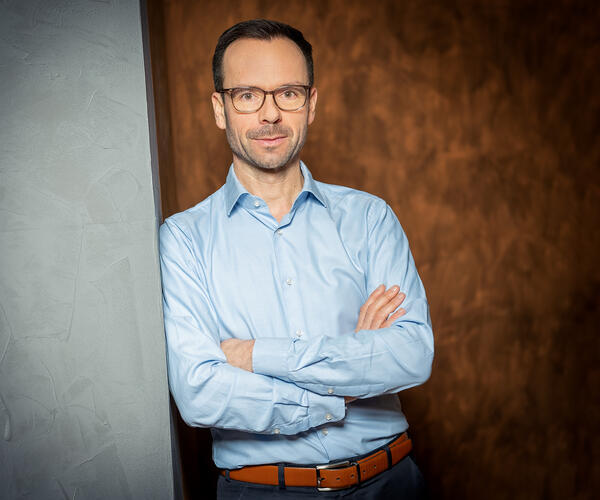"Brand management is like an orchestra"

A passion for strong brands - that is the motto of Christian Ebert, who joined Frankfurter Buchmesse team at the beginning of the year. In his new position as Director of Marketing & Sales, he is also responsible for the branding of the fair.
To put it simply: Why have you joined the Frankfurter Buchmesse now?
For me, Frankfurter Buchmesse is an affair of the heart: I like books, I like stories and I like the trade fair business - so from my point of view, the move to the book fair was only logical. However, this is not my first time, as I have known Frankfurter Buchmesse for years as an exhibitor and and as a visitor. My experience last year was particularly intense when I had the opportunity to immerse myself in the history of the book fair on its 75th anniversary shortly before I joined. The idea of helping to shape the future of the book fair seems extremely appealing to me.
"Brand management" is a term that many people use, but everyone has a different idea of what it means. Can you already say something about brand management for the book fair?
In my first few weeks at Frankfurter Buchmesse, I was told about many topics where good brand management can help. Whether it's finding a name for a new platform or clarifying the brand image at the opening ceremony - there is certainly no lack of need for action. However, it seems premature to emphasise individual topics at this stage.
Basically, brand management is not about short-term individual measures, but about a long-term concept: the brand is sustainably strengthened by harmonising the functions within the company. Brand management here is similar to an orchestra: as long as individual instruments fall out of line, the audience will feel these discords. But if the violin, flute and trumpet play in harmony, then nothing stands in the way of a unique concert.
Frankfurter Buchmesse is on the one hand a medium-sized company with a long tradition in Frankfurt - and on the other hand the largest international book fair with exhibitors from over 100 countries. What do these different facets mean for Frankfurter Buchmesse as a brand?
The multifaceted nature of Frankfurter Buchmesse can be compared to the image of rubber bands stretched from both sides. The structure of a traditional medium-sized company with the international appeal of the world's largest book fair is such a field of tension. The balancing act between B2B platform and public event is also part of it. Every year, the FBM team balances the content of the fair between the rights and licencing trade, the socio-political discourse and a literary festival.
Historically, Frankfurter Buchmesse has drawn its strength from this diversity. At the same time, such diversity makes it difficult to achieve a uniform perception of a brand. This is where brand management makes a valuable contribution by defining a clear brand essence and supporting a consistent image.
Has there been a recent marketing campaign or example of branding that has inspired you personally? And if so, why?
I keep coming across marketing campaigns that impress me - the vast majority of them are characterised by originality and creativity.
However, I am really impressed by brands that initiate their own transformation. A good example is Mattel: with its Barbie brand, the company is criticised for compromising the well-being of young girls with unrealistic body ideals. In recent years, however, the company has adapted the brand to the spirit of the times: As a result, the current collections are more diverse than before and embody different skin colours and body shapes - not just in Barbie, but also in Ken! This change has also been reflected in communication: Barbies in football outfits and STEM professions are presented on the website. And with campaigns such as #closethedreamgap, the brand is being positioned more strongly towards inclusion, diversity and feminism.
Let's look through the crystal ball into the year 2030: what do you think will be different at the fair in October?
I can't yet say what will be happening at the fair - because that depends largely on the trends and developments that will characterise our markets in the coming years.
What my crystal ball does tell me, however, is that Frankfurter Buchmesse will continue to grow in the coming years, both by tapping into new target groups and by expanding its business model beyond the physical trade fair days. In 2030, Frankfurter Buchmesse will be the undisputed No. 1 - as the industry's largest trading centre, as an indispensable stage for socio-political discussions and as the most attractive event for fans of good stories.
Many thanks for the interview!
Christian Ebert on LinkedIn(opens in a new window).
The interview was conducted by Frank Krings, PR Manager at Frankfurter Buchmesse.
